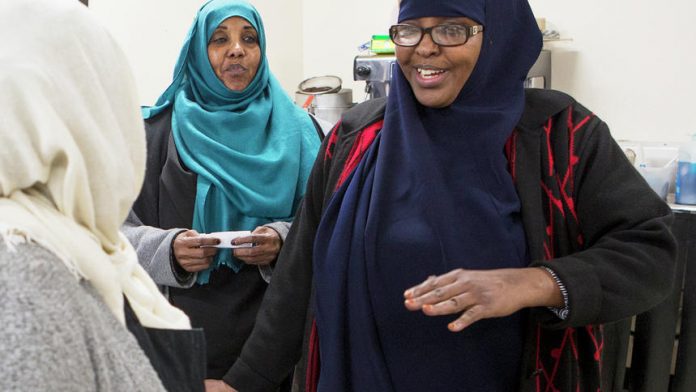
Visiting Safari Market in northwest Grand Forks is like stepping into another world.
Women in colorful hijabs sell clothing, tea and food as customers’ conversations flip between Somali and English. The smell of Somali cuisine — goat meat, lamb, rice — wafts from the kitchen as men gather around a television set near the entrance.
Originally opened as a grocery store and coffee shop on South Washington Street almost four years ago, the market in August 2017 moved to its present-day location at 1305 Stanford Road. Safari Market changed locations after being forced out by a previous landlord, according to owner Sainab Yussef. The market’s former landlord had complained about noise levels and parking issues, she said. The old location now is home to vintage decor shop Junk with Spunk.
The move may have been a blessing in disguise, though. The new site, which previously housed a laundromat and tanning salon, has given the Somali-run establishment space to open a full-blown restaurant. The menu includes a host of traditional Somali dishes, including anjeero, an East African spongy flatbread, along with “hilibgaal,” or camel meat.
Since the move, business has remained steady, Yussif said, noting she hasn’t lost any customers with the relocation. She’s seen several new faces, too.
In a region with a relatively homogeneous population — Grand Forks County is more than 87 percent white, according to 2017 U.S. Census Bureau figures — Safari Market is an outlier, and a beacon for the local Somali community.
But those who frequent the market say all are welcome, regardless of race or creed.
The market is open to “anybody that wants to come here,” said Hassan Abdi, who’s been visiting Safari Market since it first opened.
“This is the place that you can come and enjoy,” said Abdi, a Grand Forks resident for eight years. “It’s very welcoming. Very friendly employees.”
On Friday afternoons, the market hums with activity as locals stream in after attending mosque. Men will often catch up on the latest community news as they watch soccer games.
“We have a lot of customers,” said manager Raqio Awad. “After the mosque, they come to the restaurant. They bring their children. They bring their families.”
Awad moved to Grand Forks from Seattle in 2012.
Many customers come throughout the week to drink coffee or Somali tea and catch up with friends, Awad said. That includes Abdirisak Duale, president and chairman of the recently opened Al-huda Islamic Center in East Grand Forks.
Duale said he typically comes to Safari Market about three times a week. For him, it’s a good chance to build community connections.
“We like to work together with all the community, in Grand Forks and East Grand Forks,” he said. “We’re one community.”
And the Somali community in Grand Forks is a tight-knit one. Many have moved to the area from Minneapolis for work or school.
“Somali people, they help each other,” said Zahra Mire, a retired schoolteacher who now helps sell clothes at Safari Market. “If someone is getting married and they don’t have money, the community gets together, they collect money and they pay for everything.”
For Safari Market’s loyal patrons, the community aspect is a main draw. That’s been the case for Bashi Ali, an employee at LM Power who’s been in Grand Forks for about eight years.
“This is my home,” Ali said.
![]()




























